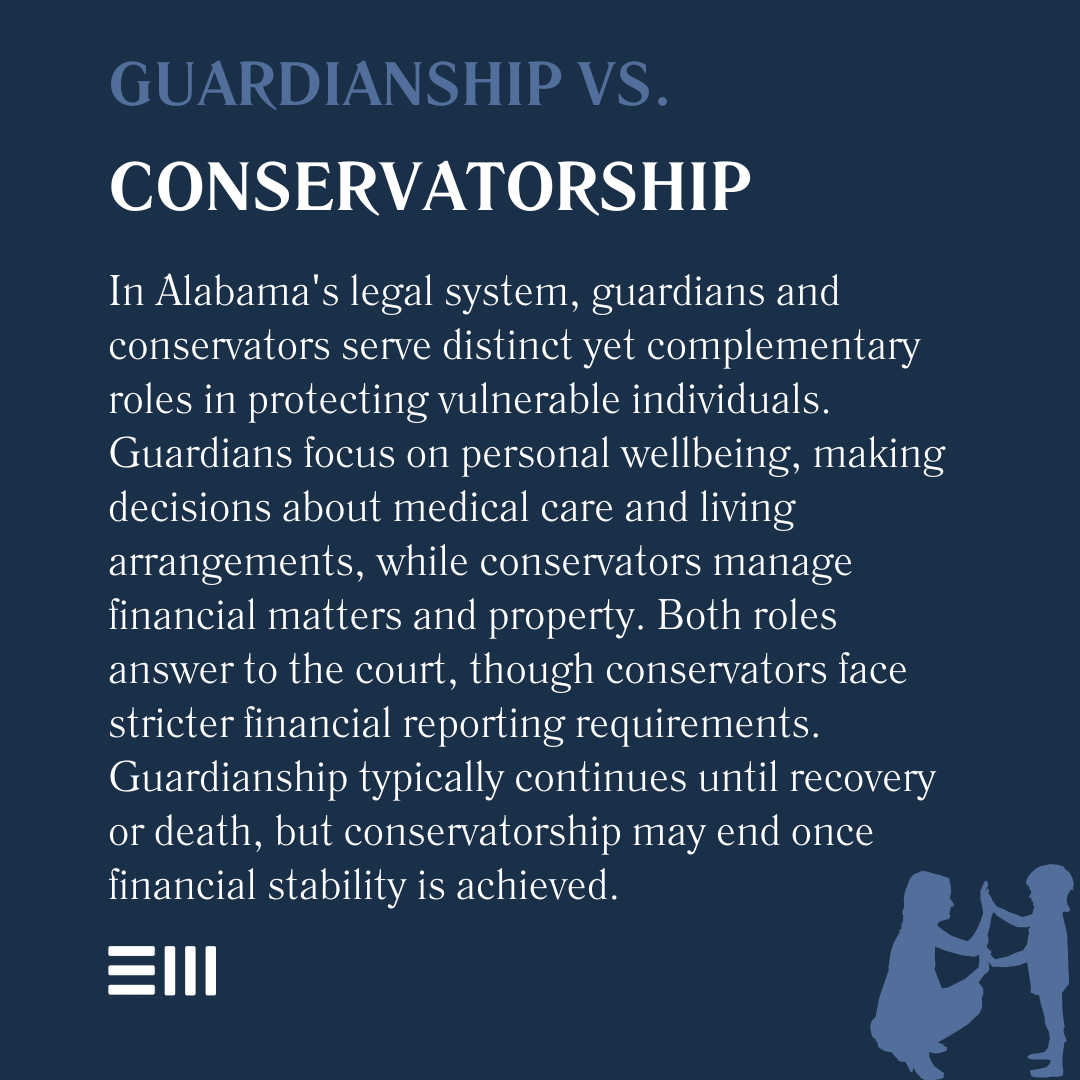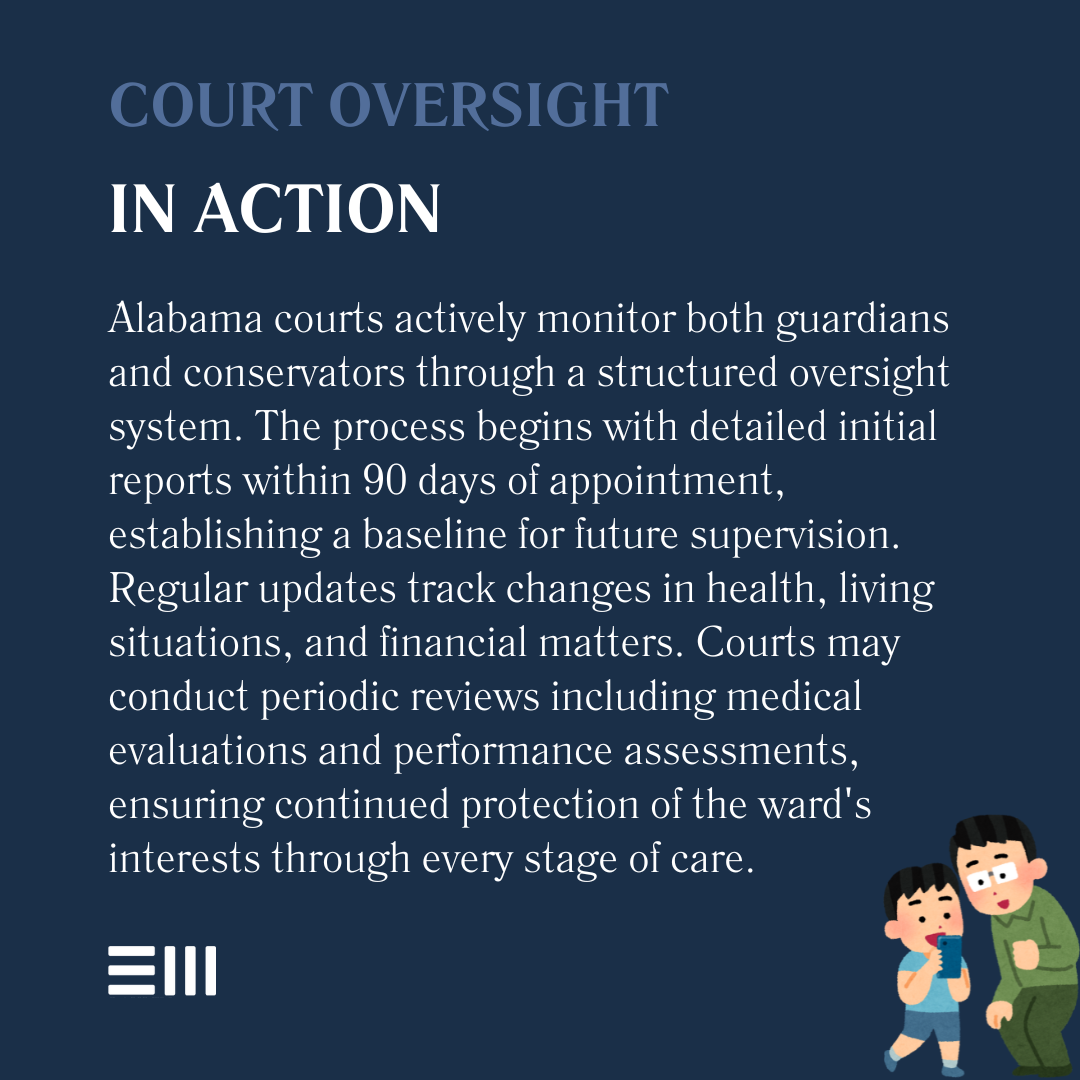Behind every court decision to appoint a guardian or conservator lies a family seeking to protect a loved one's wellbeing.
From the halls of Birmingham's courtrooms to Mobile's elder care facilities, these legal arrangements shape the daily lives of thousands of Alabamians.
While both roles serve to protect vulnerable individuals, understanding their distinct purposes and powers helps families choose the right path forward.
Key Differences Between Guardianship and Conservatorship
The distinction between guardianship and conservatorship centers on the specific aspects of care they oversee.
Each role carries unique responsibilities and limitations that serve the different needs of protected individuals in Alabama.
- Decision Scope: Guardians focus on personal care, living arrangements, and medical decisions, while conservators manage financial matters and property.
- Court Oversight: Both roles require regular reporting, but conservators face more stringent financial accounting requirements.
- Duration: Guardianships often last until the ward recovers or passes away, while conservatorships may end when financial stability is achieved.
- Appointment Process: Courts consider different factors when appointing each role, focusing on personal care capabilities for guardians and financial management skills for conservators.
These fundamental differences help courts determine which arrangement best serves the protected person's needs.
Guardian Responsibilities
Guardians play a vital role in ensuring the personal well-being of their wards through comprehensive care oversight.
Understanding these responsibilities helps potential guardians prepare for their role.
- Healthcare Decisions: Coordinating medical care and making treatment decisions based on the ward's best interests.
- Living Arrangements: Selecting appropriate housing and ensuring proper daily care.
- Personal Care: Overseeing nutrition, clothing, and personal assistance needs.
- Social Services: Connecting with support programs and community resources.
- Education: Making educational decisions for minor wards and participating in school planning.
The successful execution of these duties requires dedication and careful attention to the ward's needs and preferences.
Conservator Duties
Conservators must manage financial matters with careful attention to detail while maintaining strict accountability.
Their role focuses on protecting and managing assets effectively.
- Asset Management: Protecting investments, property, and other financial resources.
- Bill Payment: Ensuring timely payment of expenses and managing regular financial obligations.
- Financial Planning: Creating budgets and managing long-term financial stability.
- Record Keeping: Maintaining detailed financial records for court review.
- Tax Management: Ensuring proper tax filing and payment.
These financial responsibilities require both expertise and dedication to proper management practices.
Court Requirements and Oversight
The Alabama court system maintains careful oversight of both guardians and conservators to ensure proper care of protected individuals.
Understanding these requirements helps both roles maintain compliance while protecting the interests of all parties involved.
- Initial Reporting: Both roles must file detailed initial reports outlining the ward's situation, including comprehensive inventories of assets, current medical conditions, and living arrangements. These reports establish baselines for future oversight and must be submitted within 90 days of appointment.
- Regular Updates: Courts require periodic updates on the ward's condition and care. These reports must detail any significant changes in health, living situation, or needs. Guardians typically focus on personal welfare updates, while conservators emphasize financial matters.
- Financial Accounting: Conservators must provide detailed financial reports and documentation, including all income, expenses, investment decisions, and asset management activities. These reports require supporting documentation such as bank statements, receipts, and investment account summaries.
- Status Reviews: Courts may conduct reviews to ensure the continued need for protection. These reviews can include interviews with the ward, medical evaluations, and assessments of the guardian or conservator's performance. The court may also receive input from family members or other interested parties during these reviews.
- Emergency Reporting: Both guardians and conservators must immediately notify the court of any significant changes or emergencies affecting the ward's welfare or estate. This includes major medical events, substantial financial changes, or situations requiring immediate court intervention.
- Professional Evaluation Requirements: Courts may require periodic professional evaluations of the ward's condition, particularly in cases involving mental health or cognitive issues. These evaluations help determine if current arrangements remain appropriate.
Meeting these requirements helps maintain transparency and accountability in both roles while ensuring the ward's interests remain protected.
Regular compliance with court oversight requirements also helps identify and address potential issues before they become serious problems.
Choosing Between Guardianship and Conservatorship
Several factors influence whether guardianship, conservatorship, or both best serve a protected person's needs.
Careful consideration of these elements helps families make informed decisions while ensuring comprehensive protection for their loved ones.
- Protected Person's Needs: Consider whether personal care, financial management, or both require oversight. Evaluate current capabilities and anticipate future needs based on medical prognosis and life circumstances. Some individuals may need help only with complex financial decisions while maintaining the ability to handle personal care, while others might require comprehensive support in all areas.
- Available Resources: Evaluate the time and expertise needed for each role. Consider the complexity of medical needs or financial portfolios when determining if family members can effectively serve. Factor in the potential need for additional support services, professional advice, or specialized care coordination.
- Family Dynamics: Consider family relationships and capabilities when selecting appropriate candidates. Assess potential conflicts between family members and their impact on care decisions. Evaluate the geographical proximity of potential guardians or conservators to the protected person and their ability to respond to emergencies.
- Professional Support: Assess whether professional guardians or conservators might better serve specific needs. Consider the complexity of the estate, family conflicts, or specialized care requirements that might benefit from professional management. Evaluate the cost implications of professional services against the benefits of experienced oversight.
- Long-term Planning: Consider how the arrangement might need to evolve over time. Factor in the potential need for successor guardians or conservators and create contingency plans for changes in circumstances. Think about how the protected person's needs might change and whether the chosen arrangement provides sufficient flexibility.
- Cost Considerations: Evaluate the financial implications of each arrangement, including court costs, bond requirements, professional fees, and ongoing administrative expenses. Consider how these costs will be managed within the protected person's estate or family resources.
Understanding these considerations helps families pursue the most appropriate legal protection while ensuring sustainable long-term care for their loved ones. The right choice often depends on a careful balance of these factors against the specific circumstances of each case.
Frequently Asked Questions About Guardianship and Conservatorship in Alabama
Understanding the nuances between guardianship and conservatorship raises many questions for families considering these options.
Here are answers to common concerns that arise during the decision-making process.
Can One Person Serve as Both Guardian and Conservator?
Yes, courts often appoint the same person to both roles when appropriate, though the responsibilities remain distinct.
How Long Does the Appointment Process Take?
The appointment process typically takes 4-8 weeks, depending on case complexity and court schedules.
What Financial Requirements Exist for Conservators?
Conservators must maintain detailed financial records and may need to obtain a bond before appointment.
Can These Arrangements Be Modified Later?
Yes, courts can modify or terminate either arrangement based on changed circumstances or needs.
What Rights Does the Protected Person Retain?
Protected individuals retain certain fundamental rights, including the right to dignity, appropriate care, and court review of their situation.
Securing Your Loved One's Future
Protecting a family member through guardianship or conservatorship represents a significant step toward ensuring their well-being.
Our experienced legal team can help you evaluate options and navigate the appointment process while maintaining focus on your loved one's best interests.
Contact us today to discuss your family's situation and receive guidance on choosing between guardianship and conservatorship. Our Alabama guardianship and conservatorship attorneys will help you understand the options and move forward with confidence.


